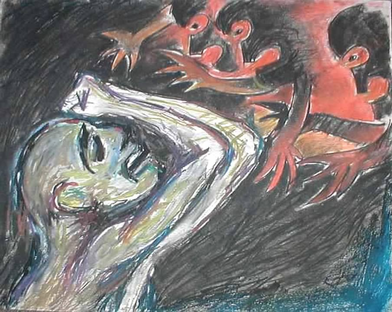|
In my previous blog post, I claimed that that part of the reason for why we tell and retell stories about those who have died has to do with the healing act of remembering. By putting up ofrendas in honor of our loved ones and by retelling the story about their lives (just like in the Disney's children's animated movie Coco), we are able to reconnect with them again in the present moment. However, there is also another reason for the significance of why we remember and honor the memory of those who have died. And that is to become a good host to our grief.  There is a phase in the grief process called “disorientation,” which is also known as the “pits.” Disorientation is the most difficult phase to go through because we are disoriented. We feel lost and confused. We are not fully functional the way we used to be. We are mentally unfocused, spacey and tend to forget. Most importantly, this is a period when we experience the very intense painful feelings: deep sadness, or grief bursts, or overwhelming anger, or perhaps incapacitating guilt, or fear.  These painful feelings come knocking on the door of our hearts and minds like uninvited guests. I say they are "uninvited" because we do not necessarily want to feel them. So as the host or the doorkeeper of our hearts and minds, we can either shut them out, and not let them in. We tell these feelings related to our grief: “You all are not welcome here. Go away.” An easy way to shut them out is to busy ourselves. This is normal. By going back to work, and by returning to our regular routines of doing the mundane tasks of our lives, we distract ourselves from these uninvited guests that remind us of the pain of the loss. As a coping tool, ignoring these feelings by busy-ing will work, but only to an extent. As a participant of my grief class said: “Yes, busying works, but only for a while.” In other words, it is a temporary fix. Why? Because by ignoring these feelings, grief does not really go away. In fact, sometimes, the pain of grief gains more strength when we ignore and refuse to name them. No matter how hard we keep grief out of our awareness, somehow grief still manages to come around and return to us like a boomerang and painfully hits us when we least expect it.  So travelling on our grief journey skillfully ultimately means NOT ignoring grief when it comes knocking on our doors. Grieving skillfully means becoming good hosts by letting them in and recognizing them. Yes, these painful feelings can be intimidating - but if we take a few deep breaths (take a couple now), and just notice. Notice where our grief stays in our bodies - perhaps it come as a kind of tightening of our chest, perhaps an achey neck and shoulders, or a churning stomach, or as an intense migraine. The amazing thing is that when we let ourselves become good hosts by staying in the present moment and closely observe how grief works in our mind and body, their power and grip over us lessen and shrink. We eventually learn that these feelings really have no real terror in them. They’re just . . . feelings.  And that’s why we remember and retell the memory of our loved ones. We do it to keep the doors of our hearts open and to become welcoming hosts to our grief. By sharing a sacred story or memory about our loved one, we honor our grief who is our guest. And our grief will not stay with us forever. Grief is not a freeloader asking for free rent space in our hearts and minds. Grief will eventually leave. And yet, neither will it go away a hundred percent. Grief will always come back knocking for a visit, even many years from now. But each time grief comes for a visit, our relationship with it deepens, and it becomes an old friend and a source of wisdom. |
Donnel Miller-MutiaJoin me in chewing the cud on mindful communication and relationships, self-awareness, spirituality and mythology. Archives
May 2024
Categories |
Proudly powered by Weebly
 RSS Feed
RSS Feed
